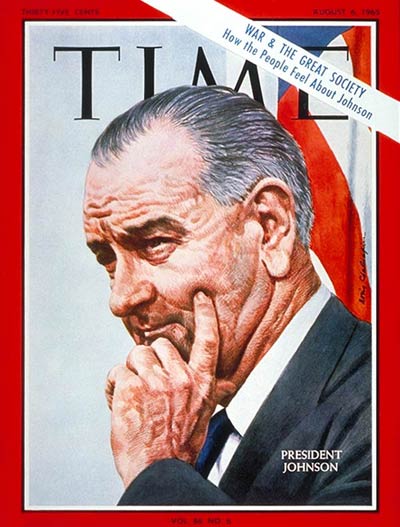
It was 50 years ago Thursday, on July 30, 1965, that President Lyndon Johnson signed the Medicare bill, turning the national social security healthcare program for older Americans into law. But, despite Johnson’s legendary powers of legislative persuasion, the celebratory signing event—complete with the enrollment of the first Medicare beneficiary, former President Harry S. Truman—could have looked very different.
After all, the idea of helping American seniors afford health care took time to gain traction: The idea came up not long after Franklin Roosevelt initiated the modern social-security system in the 1930s. When the coinage “Medicare” first came on the American scene, the program it described was not the one we think of today. In 1960, the term referred to an opposing program proposed by the Eisenhower administration. The big fear at the time was that tying any kind of health aid to social security would quickly deplete the funds available for that then-30-year-old system; Eisenhower’s version, overseen by then-Vice President Richard Nixon, would have been both voluntary and state-funded.
In that year’s Presidential campaign, however, Nixon lost to challenger John F. Kennedy—who, as TIME put it a few years later, “vowed without qualification that his Administration would persuade a Democratic Congress to pass a medicare bill, to be financed under the social security system.” Kennedy died, however, before he could make good on that promise—which is where Johnson comes in. Benefiting from his 1964 election victory, Johnson made it happen. But what exactly it would look like remained to be settled.
By April of 1965, as TIME reported, there were three options in the running: Johnson’s social-security-linked compulsory program; an Eisenhower-esque voluntary program with no link to social security; or an American Medical Association-backed plan called “eldercare,” which prioritized patient choice and was need-based. The solution came, surprisingly, in the form of House Ways and Mean Committee chair Wilbur Mills, who had been a staunch opponent of Medicare. He combined elements of the three plans into one that would succeed. The basics of the plan were compulsory and funded by increasing social-security taxes, while extras were voluntary. The program we now know as Medicaid, for those in need, would also be expanded.
“The medicare bill will not solve all the problems of growing old—but it will certainly make the process much less costly to the elderly,” TIME noted. And that wasn’t all it did, the magazine continued. The medicare bill represented a fundamental change to American political norms:
Almost 30 years ago, Franklin Delano Roosevelt signed into law the Social Security Act. At the moment of signing, he issued a statement that, in retrospect, sounds almost apologetic: “We have tried to frame a law which will give some measure of protection to the average citizen and his family against the loss of a job and against poverty-ridden old age. This law, too, represents a cornerstone in a structure which is being built but is by no means complete. It is a structure intended to lessen the force of possible future depressions.”
Social security was mostly an emergency act in a nation still struggling out of the depths of a depression in which, in F.D.R.’s famed phrase, more than one-third of the nation was “ill-housed, ill-clad, ill-nourished.” The change since then in American life has never been more apparent than last week, when Congress acted on two bills that projected a new sort of welfare state beyond Roosevelt’s wildest dreams. First, the House of Representatives passed and sent to the Senate, where it faces certain swift approval, the Johnson Administration’s $6 billion-a-year medicare bill…
Action on both bills came not in time of depression but in the midst of the most prosperous year that the affluent society has ever known. There were a few squawks about presidential pressure, but it was widely accepted that both measures would achieve great good in making the U.S. even more affluent without turning it into a socialistic society. It was generally conceded that both bills, despite the vastness of their scope, were aimed not at increasing the power of the Federal Government, but at eradicating some remaining blemishes in the Great Society.
Read the full story, here in the TIME Vault: The New Welfare State
More Must-Reads from TIME
- Cybersecurity Experts Are Sounding the Alarm on DOGE
- Meet the 2025 Women of the Year
- The Harsh Truth About Disability Inclusion
- Why Do More Young Adults Have Cancer?
- Colman Domingo Leads With Radical Love
- How to Get Better at Doing Things Alone
- Michelle Zauner Stares Down the Darkness
Write to Lily Rothman at lily.rothman@time.com